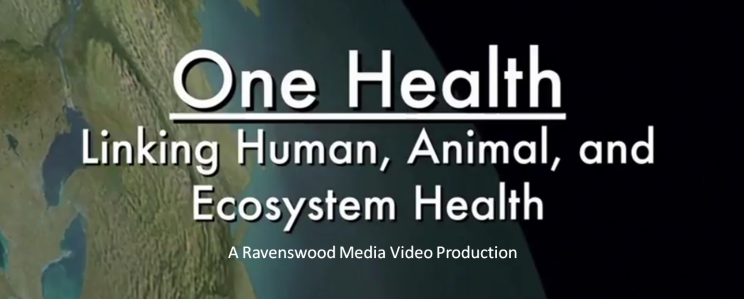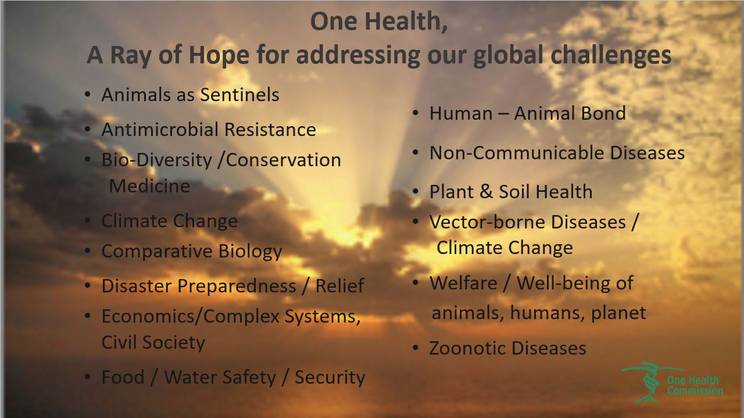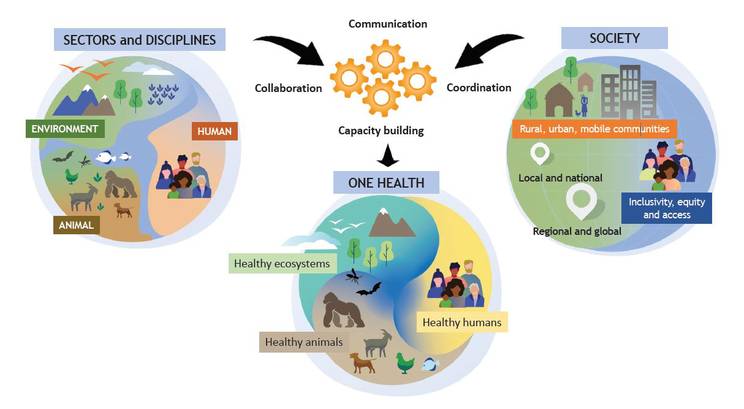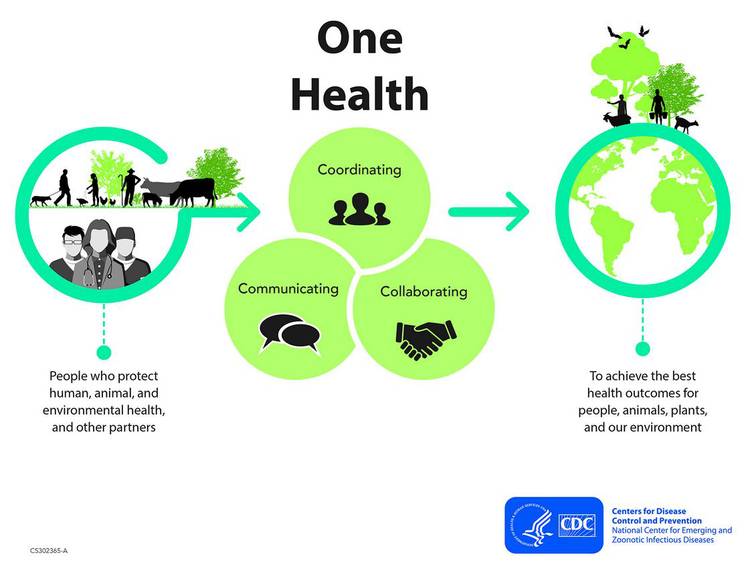Image developed by the One Health High Level Expert Panel (see reference below) - Available in all
UN languages
Definitions of One Health
Definition developed 2021 by the One Health High Level Expert Panel, an advisory panel to the One Health (now) Quadripartite made up of the FAO, WHO, WOAH, and UNEP
One Health is an integrated, unifying approach that aims to sustainably balance and optimize the health of people, animals and ecosystems. It recognizes the health of humans, domestic and wild animals, plants, and the wider environment (including ecosystems) are closely linked and inter-dependent.
The approach mobilizes multiple sectors, disciplines and communities at varying levels of society to work together to foster well-being and tackle threats to health and ecosystems, while addressing the collective need for clean water, energy and air, safe and nutritious food, taking action on climate changes and contributing to sustainable development.
One Health High-Level Expert Panel (OHHLEP), Adisasmito WB, Almuhairi S, Behravesh CB, Bilivogui P, Bukachi SA, et al. (2022) One Health: A new definition for a sustainable and healthy future. PLoS Pathog 18(6): e1010537. https://doi.org/10.1371/journal.ppat.1010537
One Health is a global 'Paradigm' for challenge driven 'Teamwork'.
The One Health paradigm forges co-equal, all-inclusive collaborations between animal, plant, environmental and human health arenas, i.e. chemical, engineering and social scientists, dentists, nurses, agricultural/ horticulturalists and food producers, wildlife and environmental health specialists and many other related disciplines that fall under its purview.
US CDC and One Health Commission (OHC) definition
One Health is a collaborative, multisectoral, and trans-disciplinary approach - working at local, regional, national, and global levels - to achieve optimal health (and well-being) outcomes recognizing the interconnections between people, animals, plants and their shared environment.
Previous OHC definition:
One Health is the collaborative effort of multiple health science professions, together with their related disciplines and institutions – working locally, nationally, and globally – to attain optimal health for people, domestic animals, wildlife, plants, and our environment.
WHO 2017 definition:
“'One Health' is an approach to designing and implementing programmes, policies, legislation and research in which multiple sectors communicate and work together to achieve better public health outcomes” (WHO, 2017).
Further descriptions:
One Health is an approach that recognizes that the health of people is closely connected to the health of animals and our shared environment. This isn't a new concept, but it has become more important in recent years.
2018 Student's Description
"At its core, One Health ..... is rooted in understanding the interdependence of human and natural systems and promoting interdisciplinary collaboration. Some of the global issues One Health works to address include environmental contamination, habitat use conflicts, biodiversity loss, emerging infectious diseases, antimicrobial resistance and ecosystem function degradation. In addition, the social determinants of health (e.g. SES, education, neighborhood and built environment, social and community context) play a critical role in health and thus, there’s a strong social and environmental justice aspect to One Health." 2018, Evan Griffith, M.S., DVM / MPH candidate at Tufts University Cummings School of Veterinary Medicine and Tufts School of Medicine, North Grafton and Medford, Massachusetts, USA

Rationale
- Worldwide, nearly 75 percent of all emerging human infectious diseases in the past three decades originated in animals.
- The world population is projected to grow from 7 billion in 2011 to 9 billion by 2050.
- To provide adequate healthcare, food and water for the growing global population, the health professions, and their related disciplines and institutions, must work together.
- Planetary Environmental health may affect human and animal health through contamination, pollution and changing climate conditions that may lead to emergence of new infectious agents.
- Human-animal interactions / bonds can beneficially impact the health of both people and animals.
Some people misunderstand and think that One Health is about everything therefore if must be about nothing. But the truth is that One Health thinking (see definition above) and implementation is needed in so many arenas that it just seems to be about 'everything'.
Because of the inextricable interconnectedness of animal, environmental, human, plant and planet health, here are a few areas that urgently need the One Health way of thinking, acting and decision making at all levels of academia, government, industry, policy and research:
- Agricultural production and land use
- Animals as Sentinels for Environmental agent and contaminants detection and response
- Antimicrobial resistance mitigation
- Biodiversity / Conservation Medicine
- Climate change and impacts of climate on health of animals, ecosystems, and humans
- Clinical medicine needs for interrelationship between the health professions
- Communications and outreach
- Comparative Medicine: commonality of diseases among people and animals such as cancer, obesity, and diabetes
- Disaster preparedness and response
- Disease surveillance, prevention and response, both infectious (zoonotic) and chronic / non-communicable diseases
- Economics / Complex Systems, Civil Society
- Environmental Health
- Food Safety and Security
- Global trade, commerce and security
- Human - Animal bond
- Natural Resources Conservation
- Occupational Health Risks
- Plant / Soil health
- Professional education and training of the Next Generation of One Health professionals
- Public policy and regulation
- Research, both basic and translational
- Vector-Borne Diseases
- Water Safety and Security
- Welfare / Well-being of animals, humans, ecosystems and planet
Learn more about the full scope of One Health, i.e. the 'many' arenas begging for this approach, in the
Potential Outcomes from the One Health Approach
- More interdisciplinary programs in education, training, research, and established policy (See http://bit.ly/2Hld7pl )
- More information sharing related to disease detection, diagnosis, education and research
- More prevention of diseases, both infectious and chronic
- Development of new therapies and approaches to treatments
See Also:
Advancing a 'One Health' Approach to Promote Health at the Human-Animal-Environment Interface, APHA One Health Policy Statement, adopted November 7, 2017.
Contributing To One World, One Health: A Strategic Framework For Reducing Risks Of Infectious Diseases At The Animal–Human–Ecosystems Interface.; FAO, OIE, WHO, UN System Influenza Coordination, Unicef, and World Bank., 2008. Available at: http://ftp://ftp.fao.org/docrep/fao/011/aj137e/aj137e00.pdf. Accessed March 18, 2016.
Executive Summary - One Health AVMA Task Force Report. JAVMA, Vol 233, No. 2, July 15, 2008.
“One Health” From Concept to Application in the Global World, Schneider M, Munoz-Zanzi C, Min K, Aldighieri S, Oxford Research Encyclopedia of Global Public Health. April 26, 2019. doi.org/10.1093/acrefore/9780190632366.013.29
One World, One Health: Summary of the FAO/OIE/WHO document, 2009, https://www.oie.int/doc/ged/d6296.pdf
The One Health Approach - Why Is It So Important?. Mackenzie JS, Jeggo M., Trop Med Infect Dis. 2019;4(2):88. Published 2019 May 31. doi:10.3390/tropicalmed4020088
US Centers for Disease Control and Prevention (CDC) What is One Health? One Health Infographic
US Department of Agriculture - What is One Health?
Learn More
Be sure to check out:
Annual Global One Health Day officially celebrated November 3 (and all year) every year since 2016
The One Health Awareness Month Calendar for more insights into What One Health is and the many arenas that are begging for this approach.
How One Health is being embraced around the world
And many, many more writings in the Commission's One Health library.









